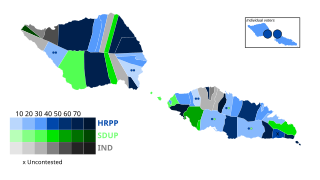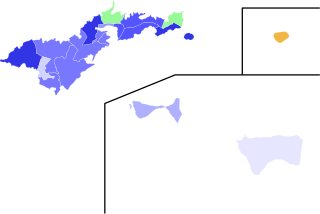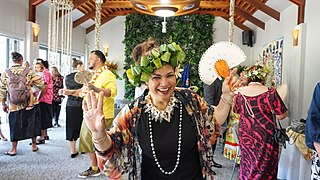
Politics of American Samoa takes place in a framework of a presidential representative democratic dependency, whereby the governor is the head of government, and of a pluriform multi-party system. American Samoa is an unincorporated and unorganized territory of the United States, administered by the Office of Insular Affairs, U.S. Department of the Interior. Its constitution was ratified in 1966 and came into effect in 1967. Executive power is discharged by the governor and the lieutenant governor. Legislative power is vested in the two chambers of the legislature. The party system is based on the United States party system. The judiciary is independent of the executive and the legislature.

Samoa, officially the Independent State of Samoa and until 1997 known as Western Samoa, is a Polynesian island country consisting of two main islands ; two smaller, inhabited islands ; and several smaller, uninhabited islands, including the Aleipata Islands. Samoa is located 64 km (40 mi) west of American Samoa, 889 km (552 mi) northeast of Tonga, 1,152 km (716 mi) northeast of Fiji, 483 km (300 mi) east of Wallis and Futuna, 1,151 km (715 mi) southeast of Tuvalu, 519 km (322 mi) south of Tokelau, 4,190 km (2,600 mi) southwest of Hawaii, and 610 km (380 mi) northwest of Niue. The capital and largest city is Apia. The Lapita people discovered and settled the Samoan Islands around 3,500 years ago. They developed a Samoan language and Samoan cultural identity.

Politics of Samoa takes place in a framework of a parliamentary representative democratic state whereby the Prime Minister of Samoa is the head of government. Existing alongside the country's Western-styled political system is the fa'amatai chiefly system of socio-political governance and organisation, central to understanding Samoa's political system.

Territories of the United States are sub-national administrative divisions overseen by the federal government of the United States. The various American territories differ from the U.S. states and Indian reservations as they are not sovereign entities. In contrast, each state has a sovereignty separate from that of the federal government and each federally recognized Native American tribe possesses limited tribal sovereignty as a "dependent sovereign nation." Territories are classified by incorporation and whether they have an "organized" government through an organic act passed by the Congress. American territories are under American sovereignty and, consequently, may be treated as part of the United States proper in some ways and not others. Unincorporated territories in particular are not considered to be integral parts of the United States, and the Constitution of the United States applies only partially in those territories.

The Human Rights Protection Party is a Samoan political party. It was founded in 1979 and dominated Samoan party politics for decades thereafter, leading every government until their defeat in 2021.

The American Samoan Legislature or Fono has two chambers, the House of Representatives and the Senate, which has a directly elected head of government, the Governor of American Samoa.

The prime minister of the Independent State of Samoa is the head of government of Samoa. The prime minister is a member of the Legislative Assembly, and is appointed by the O le Ao o le Malo for a five-year term. Since independence in 1962, a total of seven individuals have served as prime minister. The incumbent was disputed due to the 2021 constitutional crisis, when Tuila'epa Sa'ilele Malielegaoi refused to accept the results of the 2021 general election. On 23 July 2021, the Samoan Court of Appeal ruled that the Faʻatuatua i le Atua Samoa ua Tasi (FAST) party had been in government since 24 May. Tuila'epa then conceded defeat, resulting in FAST party leader Fiamē Naomi Mataʻafa becoming prime minister.

General elections were held in Samoa on 31 March 2006 to determine the composition of the 14th Parliament. The main contesting parties were that of incumbent Prime Minister Tuilaʻepa Saʻilele Malielegaoi, of the Human Rights Protection Party (HRPP); and the Samoan Democratic United Party (SDUP). In addition, three other parties, the Christian Party (SCP), the Samoa Party (SP), and the Samoa Progressive Party (SPP), competed in the election. The result was a landslide victory for the HRPP, which won 33 of the 49 seats. The newly founded SDUP secured ten seats, and the remaining six were won by independents. After the election, three independents joined the HRPP, increasing the party's seat count to 36.

Republican Party of American Samoa is the affiliate of the U.S. Republican Party in American Samoa. It is based in the territorial capital of Pago Pago.
The following table indicates the party of elected officials in the United States insular area of American Samoa:
The People's Party (TPP) is a Samoan political party. It was founded in July 2008 by campaigners from People Against Switching Sides, protesting against legislation aimed at changing the side of the road driven on. The party's chairman is Tole’afoa Solomona To’ailoa, who has stated that he does not intend to be the party's leader. According to To'ailoa, the party "will not be focusing on the road change only but [...] will be focusing on all the other issues which are affecting the lives of our people right now."

The Constitution of Samoa is a written constitution which is the supreme law in Samoa. It establishes Samoa as a parliamentary republic with a Westminster system and responsible government. It outlines the structure and powers of the Samoan government's three parts: the executive, legislature, and judiciary.

General elections were held in Western Samoa on 28 April 1948, the first to the new Legislative Assembly. The United Citizens Party won four of the five directly-elected seats.
Samoa, officially the Independent State of Samoa, has a population of approximately 188,000 people. Samoa gained independence from New Zealand in 1962 and has a Westminster model of Parliamentary democracy which incorporates aspects of traditional practices. In 2016, Samoa ratified the Convention on the Rights of Persons with Disabilities CRPD and the three optional protocols to the CRC

General elections were held in Samoa on 4 March 2016 to determine the composition of the 16th Parliament. Two parties contested the election, the ruling Human Rights Protection Party (HRPP), led by Prime Minister Tuilaʻepa Saʻilele Malielegaoi, which had been in government for most of the time since 1982 and the Tautua Samoa Party (TSP), led by Opposition Leader Palusalue Faʻapo II.

The 2020 American Samoa gubernatorial election was held on November 3, 2020, coinciding with the 2020 United States presidential elections and other United States elections. Incumbent Governor of American Samoa Lolo Matalasi Moliga was not eligible for reelection due to term limits. In American Samoa, gubernatorial candidates run on a non-partisan basis and as a slate together with their Lieutenant Governor of American Samoa candidate.

Barbara Rachael Fati Palepa Edmonds is a New Zealand politician. She was elected as the Member of the New Zealand House of Representatives for Mana, representing the Labour Party, in 2020. She served as the Minister of Internal Affairs, Minister for Pacific Peoples, Minister of Revenue and Minister for Economic Development in the final year of the Sixth Labour Government.

Pasifika New Zealanders are a pan-ethnic group of New Zealanders associated with, and descended from, the indigenous peoples of the Pacific Islands outside of New Zealand itself. They form the fourth-largest ethnic grouping in the country, after European descendants, indigenous Māori, and Asian New Zealanders. Over 380,000 people identify as being of Pacific origin, representing 8% of the country's population, with the majority residing in Auckland.
American Samoa Democratic Party is the American Samoa affiliate of the U.S. Democratic Party. It is based in the territorial capital of Pago Pago.










